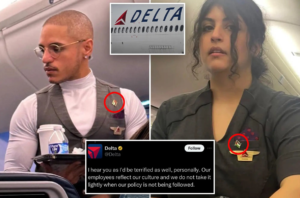In an era where airline controversies seem to crop up regularly, Delta Airlines has found itself at the center of an unexpected storm involving the Palestinian flag. This incident, which quickly went viral, has sparked debates on social media and beyond, highlighting the delicate balance corporations must maintain in today’s politically charged climate.
A Brief Overview of the Incident
In the world of air travel, even the smallest details can lead to widespread controversy. Delta Airlines recently experienced this firsthand when a Palestinian flag was mistakenly displayed on one of their in-flight entertainment screens. What seemed like a minor error quickly escalated into a significant public relations challenge for the airline. This section delves into the specifics of what happened, setting the stage for a deeper exploration of the broader implications.
The Unintended Display
The incident began innocuously enough. During a routine flight, passengers noticed that a Palestinian flag appeared on the in-flight entertainment system’s map feature, indicating the location of the Palestinian territories. This seemingly minor detail went unnoticed by many at first but quickly became a hot topic as passengers shared photos and videos on social media.
Social Media Outcry
In today’s digital age, social media platforms can amplify even the smallest issues into global conversations. The appearance of the Palestinian flag on Delta’s screens sparked a flurry of reactions online. Some praised the airline for acknowledging the Palestinian territories, while others criticized it, interpreting the display as a political statement. The incident became a trending topic, with hashtags and memes spreading rapidly across Twitter, Instagram, and Facebook.

Delta’s Response: Navigating a PR Crisis
Handling a public relations crisis requires swift and strategic communication. Delta Airlines faced a delicate task in addressing the controversy without alienating any segment of their diverse customer base. This section examines how the airline responded to the incident and the challenges they faced in trying to appease all parties involved.
Official Statements and Apologies
Delta’s initial response came in the form of an official statement. The airline apologized for any offense caused by the flag’s display, emphasizing that it was a unintentional error and not a deliberate political statement. Delta assured customers that steps were being taken to prevent similar incidents in the future. Despite the apology, reactions remained mixed, with some accepting the explanation and others demanding further action.
Media Coverage and Analysis
The incident quickly caught the attention of mainstream media outlets, which provided extensive coverage and analysis. News organizations explored various angles, including the geopolitical implications of displaying the Palestinian flag and the potential impact on Delta’s brand image. Expert commentators weighed in, offering differing perspectives on the airline’s response and the broader context of corporate responsibility in politically sensitive situations.
The Broader Implications: Corporate Neutrality and Political Sensitivity
The Delta Airlines incident highlights a broader issue faced by many global corporations: the challenge of maintaining political neutrality while operating in a world rife with geopolitical sensitivities. This section explores the implications of the controversy for Delta and other companies, examining the fine line between neutrality and taking a stand.
https://newsreporto.com/assassination-attempt-donald-trump-rally-shooting/
The Role of Corporations in Political Issues
Corporations, especially those with a global presence, often find themselves navigating complex political landscapes. The Delta controversy underscores the difficult position companies are in when it comes to addressing politically charged issues. On one hand, remaining neutral can alienate customers who feel strongly about certain topics. On the other hand, taking a stand can lead to backlash from those with opposing views.
Lessons Learned for Other Airlines
Delta’s experience serves as a cautionary tale for other airlines and multinational corporations. The incident demonstrates the importance of being vigilant about the content displayed to customers and being prepared for potential backlash. Companies must strike a balance between acknowledging cultural and political realities without appearing to endorse any particular stance.
Public Reaction: Diverse Perspectives and Ongoing Debates
Public reaction to the Delta incident has been varied, reflecting the diversity of opinions on the Palestinian issue. This section delves into the different perspectives that have emerged, showcasing the ongoing debates and the complex nature of public sentiment.
Support and Criticism from Various Groups
The incident elicited strong reactions from various groups. Some praised Delta for inadvertently highlighting the Palestinian territories, viewing it as a step towards greater recognition. Others criticized the airline, accusing it of taking sides in a contentious political issue. This dichotomy of support and criticism illustrates the broader societal divisions on the topic.
Social Media as a Reflection of Public Sentiment
Social media platforms played a crucial role in shaping and reflecting public sentiment. Hashtags, posts, and comments revealed the passionate opinions held by individuals on both sides of the debate. The incident became a case study in how social media can both amplify and polarize discussions, influencing public perception and corporate reputation.

Looking Ahead: Navigating Future Challenges
As the dust begins to settle, Delta Airlines and other companies must consider how to navigate similar challenges in the future. This section explores potential strategies for addressing politically sensitive issues and maintaining a positive public image.
Proactive Measures for Crisis Management
One of the key takeaways from the Delta incident is the importance of proactive crisis management. Companies must have robust strategies in place to address unforeseen controversies swiftly and effectively. This includes clear communication channels, regular monitoring of public sentiment, and the ability to adapt responses based on the evolving situation.
The Importance of Cultural Sensitivity
Cultural sensitivity is crucial for multinational corporations. Understanding and respecting the diverse backgrounds and perspectives of customers can help prevent incidents like the Delta controversy. Companies should invest in training programs for employees and develop guidelines for handling politically sensitive content.
The Complex World of Corporate Responsibility
The Delta Airlines Palestinian flag controversy serves as a stark reminder of the complexities that global corporations face in today’s interconnected world. As companies navigate an increasingly polarized landscape, the need for careful consideration of political and cultural sensitivities becomes ever more critical. While the incident may eventually fade from public memory, the lessons learned will undoubtedly shape the way businesses approach similar challenges in the future.
In conclusion, the incident is more than just a PR blip; it’s a reflection of the broader societal and geopolitical dynamics at play. For Delta and other companies, the path forward will require a delicate balance of neutrality, sensitivity, and proactive engagement with diverse audiences. The world is watching, and how corporations respond to such incidents will define their reputation and success in the years to come.


1 thought on “Delta Airlines’ Palestinian Flag Controversy Explained”